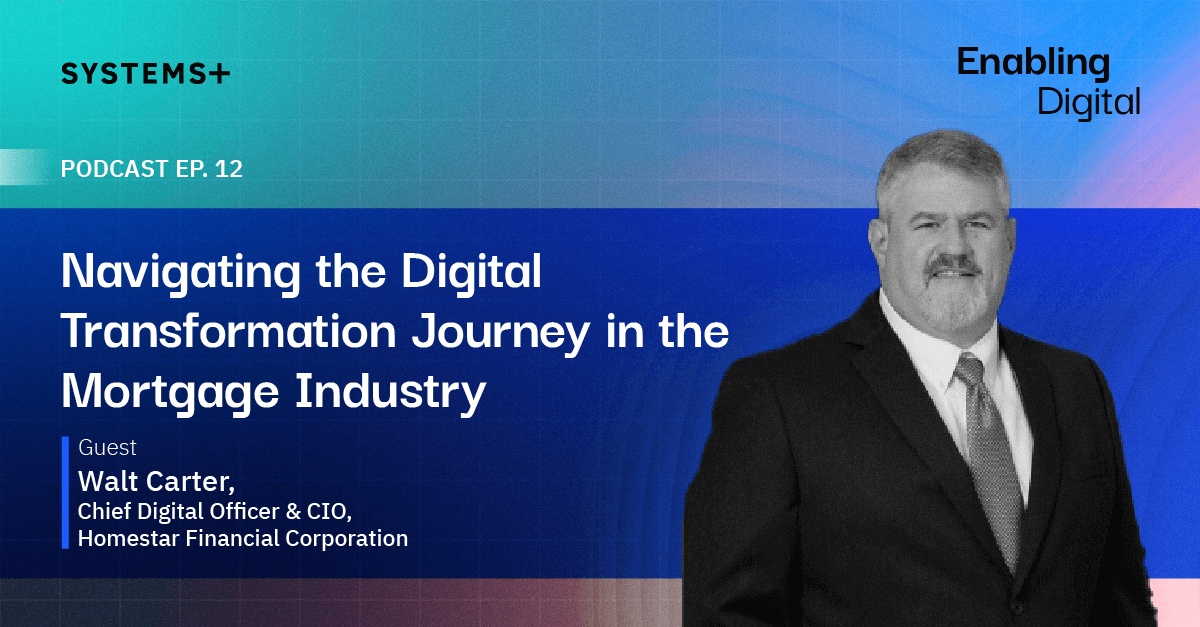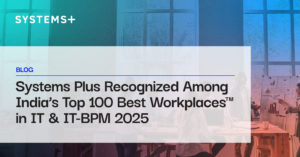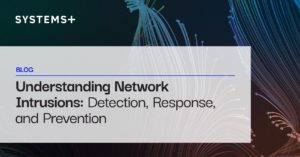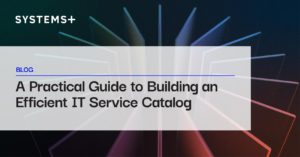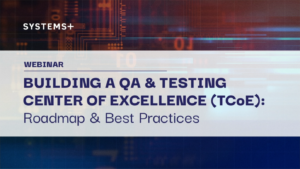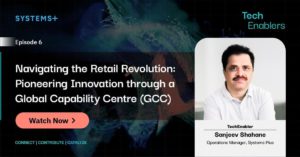Amay 0:01
Hello, and welcome to Enabling Digital with Systems Plus, I'm your host Amay and today, I'm pleased to welcome Walt Carter, who is the CIO and Chief Digital Officer of Homestar Financial Corporation. Welcome, Walt.
Walt 0:18
Oh, thank you, man. It's great to be with you today.
Amay 0:24
So well, to start, I would love it if you could share a little more about your background, I've heard it's extremely interesting from some of, your other podcasts. And then also your current role in the field of digital transformation.
Walt 0:37
Sure, so long, long time ago, you know, in a galaxy right here, I, I started out building software applications, literally 40 years ago, built a computer simulation of a nuclear part of particle accelerator, on a back in 1983. So literally 40 years ago. And, and, and, you know, I've had a number of really cool jobs along the way, which you probably referenced. You know, I spent my first few years after getting my physics degree, working on nuclear missiles up in North Dakota. And then I got to fly on LookingGlass, an airplane that does airborne command and control for US government for a number of years, three years, and then went up to NORAD headquarters in Canada, to help the Canadians understand how to use US Air Force fighter packages under that NORAD treaty. And in 1992, I got out of the US Air Force as a captain and came back home to North Carolina. And then since then, I've had a number of technology jobs, with some pretty big companies like Fidelity and, you know, Delta Airlines. And, you know, was a consultant for a number of years got to see a lot of what I call the giant hairball problems in Fortune 100 companies. And then over the last, I guess, almost 20 years here in Atlanta, I've been in a number of different roles as either a Chief Operating Officer, Chief Marketing Officer, Chief Information Officer, and now today, you know, for the last six years at Homestar, I've been the Chief Digital Officer and CIO.
Amay 2:31
Awesome. And so, first of all, you mentioned the VAX, which I've only studied about, and it's a complex machine from the sounds of it. So it's pretty cool that you got to use that at the time. And the other thing, which I thought was interesting, which I just want to if you would quickly talk through is you said, Chief Marketing Officer and Chief Information Officer, and you were sort of both at one time at some companies. If you could just kind of walk me through how did that work? Right? How did you align Business and Technology? I know I'm going a little off topic here. But I just found that an interesting anecdote to touch on.
Walt 3:04
No, it's a very fair question I've had I've actually given speeches at conventions where they were both marketers and information people, technology people in the room, because they're all asking me that same question. Well, how do you reconcile those roles are usually, you know, at odds with each other? And, you know, and the answer is that you wind up understanding fairly quickly when you occupy both seats, that one, you know, in, in it, we we are always fighting against unmanaged change, right, that's really the game is to keep all of that unmanaged, changed away from our systems and our infrastructure. Because we want to be able to restore back to a point that's known good. And so you kind of have to keep that unmanaged change out. Marketing, on the other hand, seems to be you know, hey, we need to get to the market as quick as we can, by hook or by crook or by dog sled. And what we really need is feedback. What we need right now is to know whether these campaigns are working, and whether we're getting any traction with our offerings, right? And so we need feedback. And you know, and truthfully though, what you find out is that if you could get both of those teams working together, and develop the kind of nimbleness or agility that you need to get the marketers the feedback that they need as quickly as possible in a in a repeatable, traceable, and consistent way, they win. And if you if you are willing to manage that change as the IT guy, and just go as fast as you can, but as safely as possible, I call it full Turtle power, right, go full Turtle power, right, and let's go as fast as this turtle can go and let's be ready to drop our shell at any moment. Right? You know, and again, you can balance that because ultimately what they need in marketing, they need to know that it's verifiable data, right? This is not just a whim. This is not just that we think it might be working this way, you know? Yeah. So so the best data analysis actually happens on the marketing side a lot of times, because you want to know very quickly whether this is real or not. And, again, you know, without the traceability, and the ability to link things properly, right, which is an administrative that it's not it's not sexy and marketing, you know, it's not glam. It's just administratively, how do I know which campaign is driving the needle, and which ones not? And that's tagging and bagging, and stuffing, you know, the kind of traditional stuff that we do all the time and administrative tasks for it. So like I said, it's not, it's not a real conflict, it's an imaginary conflict. And, again, you do recognize that I have a need for speed on the marketing side. And I have a need for control on its side. And as long as you satisfy both of those demand elements, you win.
Amay 6:08
Yeah, and I mean, I love that you can speak to both the business side and the IoT side and kind of use a more holistic view to drive decision-making and move faster. So, you know, well, given your experience, both as a Chief Marketing Officer and Chief Digital Officer, what are you seeing as some of the sort of emerging technologies that are driving innovation in the mortgage industry today at large? I know you've been in the mortgage industry for over 10 years now.
Walt 6:39
Yeah, the, you know, obviously, the the one that everybody's talking about right now is generative AI and of excitement about that tool set. Not a whole lot of, you know, focused thought right now, I would say, from the vast majority of people out there just a lot of excitement, because, you know, it emerged suddenly, and people going, Hey, what are we doing? What are we doing? Why aren't we doing some? Right, you know, and AI has been out there for a long, long time, as you guys know, you know, in your company, and you know, and AI requires, you know, certain high quality data, in large datasets in order for you to really take advantage of the capabilities of training neural nets, and, and doing, you know, more than just machine learning, you know, and so so, you know, there's some real fundamental challenges that I think generative AI is exposing right now, probably the most noteworthy one, in my opinion, is the lack of infrastructure, the lack of a learning lab, for us to be able to essentially put up the safety rails and the guardrails that we need in order to learn what can we actually do? And what problems can we better solve with this tool set, then without, you know, you know, and corollary, by the way, just as a way of thinking about this, I may, you know, a few years ago, everybody was all abuzz about blockchain. But what we found was, Blockchain is a really expensive way to largely do what we can already do with a SQL database, I don't really need blockchain to be able to do the kinds of things that they offer with Blockchain tools, I can do that with sequel at a much lower price point, you know, and so, what we're seeing again, is a lot of people are trying to rush to do something with AI, without thinking through that cost of value relationship, and, you know, and, you know, just like the.com, boom, before all of that, you know, you're gonna see a lot of people doing stuff, just because, you know, it's better to be doing something than not, but then they're gonna have to pay the piper, you know, at some point for not thinking their way through that. Enterprises are all looking at this go. And look, there's a lot of privacy and security risks. There's a lot of data exposure potential here that we've got to be mindful of, you know, a lot of potential things that are going to trip up our risk committees and our legal teams. So we really need to be very thoughtful and I would use that same phrase, you know, full Turtle Power, let's go as fast as we can go, but let's go slow enough to be able to stop when we need to and kind of cover ourselves if you know, you know, there's a handful of other things that are going on out there. I think, you know, we saw a huge, you know, kind of move to the metaverse and web three, that that also felt like it Petered out. I kind of had that blockchain kind of feel to it there for a while. But there's a huge opportunity in the metaverse for training. There's a I think a better opportunity in the metaverse also for collaboration and doing real, you know, joint venturing that kind of crosses geographic locations, right? You know, we kind of pushed everybody to work remotely Totally we found that a lot of people are more productive, working remotely. But now we need to pull them back together in a way that makes sense. And we don't want the travel costs and the lodging costs. So the metaverse offers a tremendous opportunity for us to do those kinds of collaborative things in that environment. And so I think I think we're gonna see training and collaboration, you know, happening in the metaverse more and more over time, you know, and again, you know, a lot of opportunity for us to learn there. A lot of a lot of really cool stuff, though.
Amay 10:33
Yeah, and I think, from my conversations with other CIOs, where, especially with generative AI, it's okay, everybody needs to do it. But then when you try to really dig down into it, what is the use case? What are you trying to solve for? And how can I be applied is where you normally don't get a very good answer. And I'm still waiting for some, you know, in some industries, but you're talking about use cases of metaphors. And I'd love to hear how you're looking at maybe the metaverse or just automation in general RPA, some of those sorts of technologies in the mortgage industry, and in the mortgage process today, what is top of mind for you as a Chief Digital Officer.
Walt 11:12
So I think the mortgage industry in general, is, is ripe for, you know, a technology, you know, intervention in a lot of ways, you know, we are, you know, very much a manual, throw bodies at it kind of culture across the board, you know, not unlike healthcare, and, you know, a couple of other, you know, notable, you know, industries out there, you know, it's always easier to manage automation into a manufacturing type of environment. And when you start moving into services, it gets a little bit more nebulous. Right, and, and yet, you know, we've got plenty of opportunity here, we turned on RPA, you know, in several threads over the last few years that I've been at at Homestar found out that worked really well for us now that now that you've got the ability to layer on some workflow engines on top of that RPA. And then generative AI for curation and distribution of real effective knowledge management. Now you've got, you know, a really potent tool set that I think is going to really change the way we do the mortgage process. And I think he's going to change it at the front end, as well as the back end. And so, you know, there's, there's a lot of consequences to being able to pull these tools out, I also think that you know, that you're gonna see, just like in health care, or resistance to use the new technology, you're gonna see that, you know, as a slow roll, not a fast roll, the SE some disruptors jump in and go to kind of clean sheet, let me just reengineer this whole process using these kinds of tools, and they're gonna have good results. Because it's not that complicated. When you get right down to it. It regulatory environment is tough. But it's pretty well defined in a lot of ways. So, you know, I think I think there's tremendous opportunities to disrupt this industry, with technology. And I think we're going to see that now sooner rather than later because of the emergence, particularly of the generative AI.
Amay 13:19
Yeah, and I mean, I think it's amazing the amount of potential technology has to disrupt certain industries. But what we've often found as a big sort of roadblock, is okay, choosing the technology is just the tip of the iceberg actually implementing it and driving change to your organization and getting people to use it. Like you said, there was resistance in the healthcare industry, they use a lot of technology. What are some of your strategies to overcome that and drive that change management across the organization?
Walt 13:51
So the best strategy that I've encountered over the years and again, I've been doing this for 40 years, I may and I actually wrote a book a couple of years ago on change leadership. I think organizational change management is one of those underfunded, and you know, frankly, underappreciated elements of change, right? You know, and to drive adoption. The absolute number one best strategy is to get your stakeholders involved in problem definition. As early as you can get everybody thinking about a problem, what problem are we solving, right? And what problem set in a digital transformation, you're looking at a set of problems, not just one, and you're looking at a lot of things that you can't possibly know upfront, sorry, my CFO, friends, but you're not going to be able to detail out to the penny, what the budget is going to be because you're going to encounter a bunch of unknowns as you try to go from an analog world to a digital world. And you know, as you encounter these new technologies that we've been talking about today, already a May, you're going to encounter a you know, a lack of experience and now Imagine your team's lack of awareness of what tools apply to what part of the problem set. And so you've got a lot to learn as you move through all of this, and and the change leaders that that recognize this are going to be the ones that drive through and achieve the value drops that are significant. The guys that are not doing organizational change management, the guys that are not involving key stakeholders in the problem definition, up front, right, because that's where you get everybody engaged, you get the people in engaged in, let's make sure we're solving the right problem, then we'll apply the right tools and the right workers to those problem sets. You know, the general mess out there of digital transformation right now. And, and overall, you know, frankly, programs and projects, over the years have been dismal. You know, we just, we don't lead? Well. That's the truth of it. Right? The number one problem is executive leadership, executive sponsorship is not good. And you know, and again, you don't have enough people that really own the problem set to also then own the solution set.
Amay 16:14
Yeah, and I think one of the things that you do mentioned in some of your articles is this concept of a tune-up, right on the, on executive side, and the importance of that. So you know, I would love if you can, you know, talk a little bit about the concept of a tune-up.
Walt 16:30
Yeah, and it's, it's really kind of related to my experience, you know, in a band, you know, in middle school in high school, right, you know, I show up at the band, you know, and, you know, get my saxophone out. And the first thing we do is we all play concert B flat together, to see who's in tune, and whose attitude, right, and we all tune to that concert B flat and we start to address the music together in tune at the beginning, then you play for a little while. And what happens is your instrument gets out of tune again, right? So you got to keep tuning, as you continue to work out together. Well, it turns out that an executive team needs to go through that same kind of process, we can get alignment for a minute. And then we're going to have to keep tuning and make sure that we stay aligned all the way through whatever that joint effort is that we're working on. And, and you know, there's some tools that I've talked about on the other podcast and in my books about how you do that. But, you know, the most important thing is just to make sure everybody agrees on, here's what we're doing, here's why we're doing it. And here's how we're going to know when we're done. And if you can get people to stay aligned and tuned on just those three elements, you've got a really, really great chance of delivering successfully. As soon as you see, you know, cracks in that foundation. I don't know why we're doing this. What are we doing? Again? How are we going to know when we're done? I don't know. Right? As soon as you see cracks in those foundational elements, then you lose. And that's, that's a real problem for a lot of teams. A lot of teams don't don't do tuning either, right, they do great launches, but then they don't come back and make sure that everybody's still staying on the same page. And if you think about it, as you move through, especially a transformation, you're going to be adding people to your team kind of throughout that lifecycle. It's not static, it's dynamic. And as you add those new people, you got to get them grounded in that same set of foundational elements as the team that started, right. And the best way for you to do that, as a leadership team. Turns out not do it yourself as a leader, but to have the people at the lower levels in the organization, explain the problems, explain what they're doing to try to solve those problems, and then answer those three questions. What, why? And how are we going to know we're done? Right, and the more you get that bubbling up from the bottom, the more likely you are to keep the whole band and to all the way through.
Amay 19:01
Amazing so it feels like it's evolving from a band maybe to like an orchestra of sorts, right? And within with an expanding team and everybody trying to be in sync and play together. What you
Walt 19:16
think about your leadership role there, and the orchestra is a good analogy, right? You know, if you want to get if you want to get a lot of musicians on a stage, and you want to get them all playing, you know, in tune with each other, but a complex, a complex piece of music, right, you know, big complex piece of music that involves a full orchestra. Then you got one guy that stands up in front and just waves the baton right he waves a baton he's keeping time for everybody's telling you this is the timing that I want everybody to stay on, you know, and every once in a while he's he's waving at a certain group in the orchestra and you know, pushing some others down, go quiet here, raise more here, right and so it truly is an orchestration. to involve all of those different groups with different skills, different instruments, you know, and then pulling it all together in a way that emotionally connects with an audience. Right? You know, the highest reward for an orchestra is actually a standing ovation. And the standing ovation is a representation that, that orchestra and that Maestro delivered in a way that connected the music emotionally to that audience in such a powerful way that they felt like given that that upward, you know, and standing applause, right, you know, it's one thing to deliver a project and have to move to the next one with no celebration, it's another thing all together, you know, hey, we just saved the company, hey, you know, everybody is standing up and giving us the standing Oh, because without this project coming in on time, and with this value, then, you know, we were we were not going to do well as a company, right? I mean, what a difference, right? And the way you think about what you're doing?
Amay 20:58
Yeah, and I mean, you know, we're talking about the importance of people and their value in these digital transformation initiatives. But amidst all of this technology, amidst all these new sort of emerging things, such as generative AI, how do we sort of get people on board? And how do we emphasize that, hey, this is not going to take away our job, but you will have to do things differently, right, like, how do we, how do we help people understand that?
Walt 21:24
I don't know the answer to that. I may, I really wish I did. You know, because that fear factor of this is going to cost me my job is one of the biggest elements of resistance to change that I'm seeing out there. A lot of people don't understand the technologies don't understand the tools. And they are, you know, really, really afraid. And, and I get that it makes perfect sense to me. You know, I'm a pragmatist. And, you know, I believe that a number of these jobs are going to change in you know, fundamental ways, you know, people that have been, you know, looking at a screen moving data from, you know, a document or you know, an element of data, that that is on one page, and then moving it into a spreadsheet or some other system, those jobs can be done today, by RPA. Right, you don't need, you know, the exciting, sexy new technology. To do that you can, you can largely replace a lot of those stare and compare jobs with with RPA. You take a workflow engine and put that on top, and you start moving the data in an intelligent way. And yet, you know, in accounting, the number one tool set today is still excel. You know, and, you know, we've had giant systems like Oracle, and SAP and PeopleSoft before all of that, you know, and you would think people had moved out of Excel a long time ago, but no, no, I tried to kill it, try to kill it. Right, it'll cost you your job. Right, you cannot get these guys out of Excel? Because it's it's a comfort zone for them. Right. You know, so I think, I think it's a legitimate question and legitimate concern. And I think my answer to it is pretty much the same as on the other which is, the more I get the people at the lower levels, the actual job holders, engaged in the process of changing their processes, and owning their problems and owning the solutions that go with them, the more likely we are to get adoption, and, you know, and an accelerated use and an acceleration toward the value drop, which we're really looking for. Right? And, and, again, you've got some people that are going to fight you no matter what, because they're just wired that way. And I've got, you know, recommendations for how you negotiate that, in, in my first book, I'm actually working on book number two right now, which is called driving behind idiots. And it's, it's, it's a book about leadership systems, and you know, how to implement a leadership system so that your leaders know, what they're accountable for, and how they're going to be held responsible. And, and, you know, because in a lot of organizations, and just like we said, a minute ago, right, a lot of these projects and programs fail because of bad leadership. And it's because you don't, you don't pretty clearly define what the boundaries are for the leader. And, you know, you got to set expectations fairly for everyone that's involved in these change projects. And if you miss that, you've missed the whole thing, to be honest, but it's really all about the people. It's less and less about the technology. I mean, I've been doing technology work for 40 years now, like I said, and I have rarely ever seen the insurmountable technology problem. Right. If you give us enough time, and enough money will solve your technology problem. But on the other hand, I've seen over and over again, projects get derailed or stalled unnecessarily because of the insurmountable people problems. That line and tuning problem, right? And, you know, and so, you know, you've you've always got conflicting agendas within the silos in a company and the silos are normal. That's just the way humans behave. I mean, go look at any high school or middle school, and you'll see all the little cliques. Right, you know, it's just a normal part of, you know, the tribal behavior, if you will. Right. So I really think that our project leaders, project managers, executive sponsors, all needs psychology training, they need to understand, you know, how humans work, you know, and if they understood that better than they would understand how to lead those humans from from one process to a new, better process.
Amay 25:40
So, so out of curiosity, you know, because we're now mostly in hybrid remote type situations, right? How is that affected? Some of these alignment issues that you're talking about these people have problems? And what are your thoughts on that in the longer term?
Walt 25:54
Well, you know, we didn't see with the rush to remote, the rise of this hybrid, and, you know, I think we're gonna be stuck with that for a long time. You know, a lot of people just go and look, I was much more productive outside the office than coming in, I don't, I don't relish the idea of jumping back into traffic for two or three hours a day. Right, you know, that doesn't help our productivity does it. And so, what we also saw, though, was the lack of ability to build our culture, and you know, to get new people into a culture, and help them find their way sooner rather than later, operating in the islands by themselves was not conducive to collaboration and teamwork. And so you know, so there's a, there's a mix of problems there on both sides that we got to solve for. And that's what hybrid is trying to resolve the hybrid world is going to resolve which workers are most productive, where, and and how do we best take advantage of that, in order for our business to thrive in this new world that we're kind of moving into? You know, and again, a lot of these tools help with that. I think particularly the multiverse that Metaverse world. Right? Those gives you that opportunity for for proximity and engagement in a in an innovative way that doesn't require you to leave LA and you know, come to Georgia for instance, right? You know, you can you can meet in a room in the metaverse and do everything you need to do. There's actually a mortgage company I just saw in in California that does everything in the metaverse so they they invite their clients to come into a virtual room, you know, sit down at a virtual tabletop and meet their loan loan officer, all with an avatar. Right. And it's kind of cool. I mean, it's a little hokey, too, but it's cool in it, it'll evolve. Because, again, you got customers, I'm we operate in 46 states. And by the end of the year, we'll be in you know, all 50 states. But But bottom line is you look at that you go, I think there's some tremendous opportunity to use these emerging technology tools to help facilitate more human connection. And if we think about it that way, then we win, I think.
Amay 28:14
Yeah, so more like embrace the technology and see how you can use it versus resisted and try not entirely stay away from it as long as you can. I love it. The you know, just speaking of these emerging technologies, Metaverse, you know, generative AI, you spoke about data privacy? What are some of those sort of ethical considerations and privacy considerations that you should think about, even though you're trying to move super fast with some of these new technologies? Well,
Walt 28:43
yeah, I think these are some of the tougher problems for us. You know, I also kind of think, a little differently about some of this than some of my peers. I had, I had a great conversation a few years ago with the guy that founded chick fillet here in town. He's passed away since then, but he had just come back from Congress where he briefed both the House and the Senate in a joint session on the topic of business ethics and Truett. Cathy told, told a bunch of us here at the Atlanta History Center one night, you know, you know what I told them all that told them, there ain't no such things as business ethics, you hire people in your business, and that person that you hired either has as ethics, or they don't, right, and either way, your business doesn't have ethics, but an individual either has it and uses it or doesn't. And you have the consequences either way, so make sure you hire people with ethics. Right? And that's, that's kind of the takeaway. The technologies don't have ethics, right? They get the ethics get programmed in, essentially by us people, right? You know, so either the coders have ethics and they build that that ethical bias in or they don't have of ethics. And they take that ethical bias out. Right. And so when you when you start thinking about these technologies, and where they're they're being, you know, built and originated, it should give you some pause about, you know, that ethical consideration, but I don't think we're going to be able to reverse engineer our way out of some of these bad decisions. We're just going to have to have consequences. And that's, that's a real challenge for us.
Amay
Yeah. And so I love the fact that you think about it from an individual level. And businesses fundamentally don't have ethics. That it, of course, it stresses the importance of hiring the right people, which is very challenging. But what are some of the other you know, finally, to wrap up? What are some of the other opportunities and challenges that you see in this ongoing journey of digital transformation?
Walt
Well, probably the biggest the biggest one is, you know, the emerging regulatory world of privacy. Right? And, you know, and what does that mean? I mean, when we look at in my business, we look at the California Consumer Privacy Act, you know, more broadly, internationally, you're looking at GDPR, and you're looking at some of the learnings that have already happened there. You know, you've seen a lot of the states here in the United States, you know, following California, very closely, you know, so we're gonna see a whole lot more focused on privacy, and personal security of data. Right. And, and yet, every time those regulatory guys, you know, load up on us, what they're really doing is adding cost to our business. But there's no offsetting revenue opportunity, right, they're just adding costs. So it's decrement in our margins. And, and that means we've got to be more creative about finding new revenue streams to offset that cost thing. And that's where, you know, again, my thinking on this may be contrary to a lot of others. But I think that's one of the biggest problems in healthcare pricing, for instance, right, you know, we layered in all of these regulations, and all of these, you know, detailed, you know, cost elements that you can charge for, and here's how the limits were set by the government in the insurance agencies. And now the doctors and practitioners are out there having to get real creative about how they bill us, because there's not enough money in this stuff that they're serving us. Right. And it's creating opportunities for these ethical concerns, right? Corruption, why does an aspirin cost me $200? Well, the answer is because I can charge you for $200 for an aspirin, but I can't charge you the full amount that it cost me for you occupying the bed. Because I'm cap there, right. So I'm going to charge everything I can for the bed, but I'm going to make up the difference by charging you higher for the aspirin. And you've got to think and ecosystems of May, I mean, let's look at a different problem. Right, right. Now you got a huge concern about commercial real estate, in downtown Atlanta, where I live. And I saw a big article on that right before I log in with you. You know, and a lot of a lot of the businesses that were built to serve the office workers, without the office workers, they're going out of business. So the ecosystem is suffering, right? And the owners of those buildings are gone. But if the office workers are not in the buildings, then what is the value of the real estate? Yeah, so you've got this ecosystem problem. It's not just do we put our people back to work in the office or not? It's a question of, well, what about those restaurants? Do we need to protect those restaurants and the dry cleaners and childcare facilities that were all built to help our employees navigate those parts of their lives while they were at work? Right. And so when you start thinking about these problems, you know, from a root cause level, you start seeing, it's not just one problem, there's a whole lot of elements in an ecosystem that you've got to address. And so I don't think these are lightweight little problems, either, right? Healthcare is not a lightweight problem. And certainly, you know, returning to the office or not returning to the office, those are going to be complicated for us.
Amay
Yeah, yeah. I think there's no shortage of things to think about. And definitely thinking about in an ecosystem is the right way to do it, but definitely not easy. And so, you know, finally, well, duh, I think that's all we had for today. The only thing I would leave with is if how can our listeners get in touch with you or follow you, whether it's on LinkedIn, Twitter, social media, what's the way for them to get the best way for them to get in touch with you?
Walt
Great, so the easiest way is on Twitter or x at Walt seven, four, I'm at Walt seven, four on on x. On LinkedIn, I'm Walter G. Carter. So you know find me on LinkedIn there and definitely connect with me if you if you listen to the podcast today and want to have a relationship, you know, I love that stuff. You know, and then if you want to access my book, go out to We can't stay here.net or go straight to the Amazon store and you'll find three different books versions of the book there and at Amazon, it's selling well. And every time we get on a podcast, it sells a little better. So I appreciate. And you know, and again, my goal in that book, I may just for the sake of the audience is, I spent a lot of time learning the hard way, how to do change and implementations of, of technology. And I thought I should write all this down so that other people don't have to sweat so hard, and maybe pick up as many scars as I have over the 40 years.
Amay
Awesome. And I really hope you get a new audience with some of Indian listeners, because that's where we're based out of, and thank you for joining the podcast. Welcome.
Walt
Thank you, man. Thanks for having me. I appreciate it. And for all my brothers and sisters in India, you know, I spent a lot of time over there. I love that place. So, you know, let's, let's let's do technology, right? Let's just do it the right way. And by the way, I think you hit on it early, right? It's all about the people. So if you treat the people, right, the technology will flow. If you don't treat the people right, they'll resist you all day.
Amay
Awesome. Thanks.
